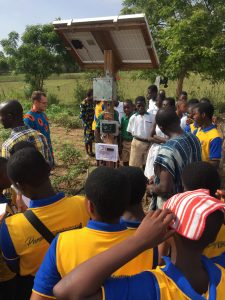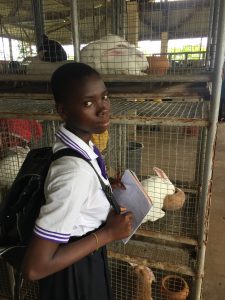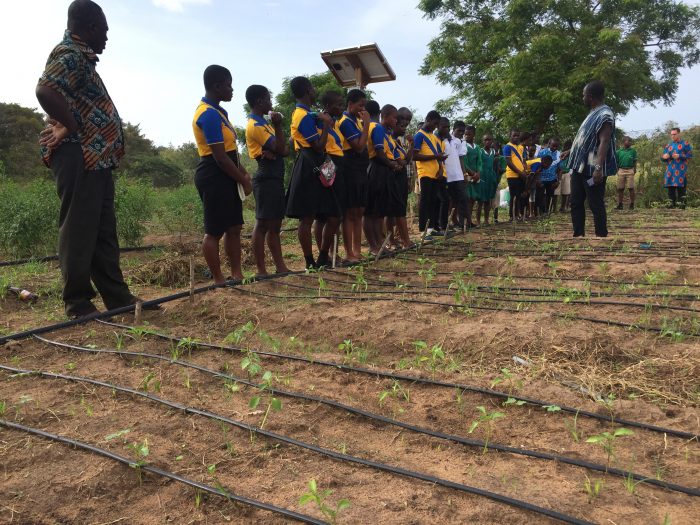Earlier this month, The Akatakyiwa and Mt. Zion 4-H Clubs participated in an excursion to the University of Cape Coast (UCC) and Cape Coast Castle, exposing students to a variety of agricultural practices and research as well as  historic sites.
historic sites.
The day started off bright and early for the 32 students and 5 teachers with a tour of the UCC Farms. The research, teaching, and practical demonstration farm site exposed students to a solar powered drip irrigation project, designed by a theoretical physicist at UCC. The pump, the first of its kind in Ghana, communicates with soil moisture sensors to deliver water when needed for optimal plant growth. Professor Dompreh, the system’s designer, explained its operation and how all the parts interacted with each other, making water usage extremely efficient.
 Following the irrigation system, the tour continued to the animal production units. While the teaching farm hosts a variety of livestock, the students were able to interact with the pigs, chickens, and rabbits. In each of the different barns, the university student leading the tour taught the students how to handle the animals, what their diet was like, and the products created from each animal. While the hog barn was a personal favorite (I was able to discuss piglet processing and proper management methods with my students), the rabbit barn was a favorite for the students as they were able to handle newborn rabbits and hand feed each pen.
Following the irrigation system, the tour continued to the animal production units. While the teaching farm hosts a variety of livestock, the students were able to interact with the pigs, chickens, and rabbits. In each of the different barns, the university student leading the tour taught the students how to handle the animals, what their diet was like, and the products created from each animal. While the hog barn was a personal favorite (I was able to discuss piglet processing and proper management methods with my students), the rabbit barn was a favorite for the students as they were able to handle newborn rabbits and hand feed each pen.
Next was a visit to the tech village and agriculture lab. Starting at a gari processing facility (gari is a traditional Ghanaian food made from fermented and dried cassava, a tuber) and finishing at the extensive snail cages, the 4-H members saw several different mating pairs of snails and a bounty of small eggs waiting for the right time to hatch. The tech village visit was concluded at the agriculture lab tour, the first laboratory that any of the students had seen in person. There, a lab technician showed the students various lab instruments and equipment like the gas ports, hood, glassware and emergency eye wash station. Safety was emphasized through the whole tour, giving students an insight into how science is practiced at the university level.
The last stop at the University was the ICT Center. Students were given a very thorough tour of the main ICT Lab on UCC’s campus. The tour guide, a UCC student, discussed the center’s routers, servers, and resources that are made available to students at the university.
Switching gears, we finished the day at Cape Coast Castle. An old British fort used to hold slaves bound for the Americas via the Middle Passage, it is now a historical site drawing thousands of visitors a year. The students were every engaged throughout the tour asking tough questions about the history of Ghana and its relationship with colonial powers that used Ghana for their own gain. The tour guide led our group through the holding cells and outlined the horrors Ghanaians experienced while being held at the Castle and beyond, when they were enslaved in the Americas.
Overall, the students and teachers had a great experience. The students were able to witness different types of agriculture that they had not experienced before. But most importantly, they were able to interact with 4-H members from a different school and see higher education as a possibility for themselves and agriculture as a worthy career choice.
Ellen Lupkes is an Agricultural Communications and International Agriculture graduate from Iowa State University. Before becoming an AgriCorps Fellow Ellen studied abroad in Panama, Ireland and Australia.


